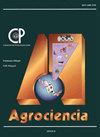INTERVARIETAL CROSSES, AN ALTERNATIVE FOR INCREASING YELLOW MAIZE (Zea mays L.) PRODUCTION IN VARIABLE ENVIRONMENTS
IF 0.5
4区 农林科学
Q4 AGRICULTURE, MULTIDISCIPLINARY
引用次数: 0
Abstract
In Mexico, maize (Zea mays L.) is grown under rainfed conditions within immensurable number of variable environments that limit production. To cope with these adversities, genotypes of different genetic constitution have been generated, such as intervarietal crosses; however, knowledge of the yield potential of those crosses in variable environments is limited. The objective of the study was to determine the yield potential of intervarietal crosses of yellow maize in environments of high-valley lands in central Mexico, as well as the components that influence yield under the hypothesis that intervarietal crosses are equal in yield to conventional hybrids. Crosses, open-pollinated parental varieties and commercial controls were evaluated in a randomized complete block design. Fifteen agronomic variables and yield components were measured. A combined analysis of variance and comparison of means (Tukey, p ≤ 0.05) were applied, and Pearson’s correlation coefficients were calculated. The analysis of variance detected statistical differences in all the factors of variation in most of the evaluated variables. The intervarietal crosses performed statistically equal to the controls but superior to the parents. The crosses excelled in ear diameter and ear length, total weight of grains in the ear, 100-grain weight, grain length, grain width, plant height, ear height, shelling corn coefficient and prolificacy index. In 23 crosses, the genotype × environment interaction effect was not significant. Intervarietal crosses have yield potential compared to conventional hybrids. Ear and grain traits had the greatest influence on yield. Intervarietal crosses represent an alternative to increase yield and production of yellow maize in the high-valley lands of central Mexico.品种间杂交——黄玉米增产的一种选择可变环境下的生产
在墨西哥,玉米(Zea mays L.)是在雨养条件下生长的,但存在大量限制产量的可变环境。为了应对这些逆境,产生了不同遗传结构的基因型,如品种间杂交;然而,对这些杂交品种在可变环境下的产量潜力的了解是有限的。该研究的目的是确定玉米品种间杂交在墨西哥中部高河谷土地环境下的产量潜力,以及在品种间杂交与传统杂交产量相等的假设下影响产量的成分。采用随机完全区组设计对杂交、开放授粉亲本品种和商业对照进行评价。测定了15个农艺变量和产量组成。采用方差分析和均数比较(Tukey, p≤0.05),并计算Pearson相关系数。方差分析发现,在大多数评估变量的所有变异因素中存在统计学差异。品种间杂交在统计上与对照相当,但优于亲本。杂交品种在穗径、穗长、穗粒总重、百粒重、粒长、粒宽、株高、穗高、脱壳玉米系数和繁殖指数等方面表现优异。在23个杂交中,基因型与环境互作效应不显著。与传统杂交品种相比,品种间杂交品种具有产量潜力。穗粒性状对产量的影响最大。品种间杂交是提高墨西哥中部高河谷地区黄玉米产量和产量的另一种选择。
本文章由计算机程序翻译,如有差异,请以英文原文为准。
求助全文
约1分钟内获得全文
求助全文
来源期刊

Agrociencia
农林科学-农业综合
CiteScore
0.50
自引率
33.30%
发文量
51
审稿时长
18-36 weeks
期刊介绍:
AGROCIENCIA is a scientific journal created and sponsored by the Colegio de Postgraduados. Its main objective is the publication and diffusion of agricultural, animal and forestry sciences research results from mexican and foreign scientists. All contributions are peer reviewed. Starting in the year 2000, AGROCIENCIA became a bimonthly and fully bilingual journal (Spanish and English versions in the same issue). Since 2007 appears every month and a half (eight issues per year). In addition to the printed issues, the full content is available in electronic format.
 求助内容:
求助内容: 应助结果提醒方式:
应助结果提醒方式:


